Jump to the content
- {{#headlines}}
- {{title}} {{/headlines}}
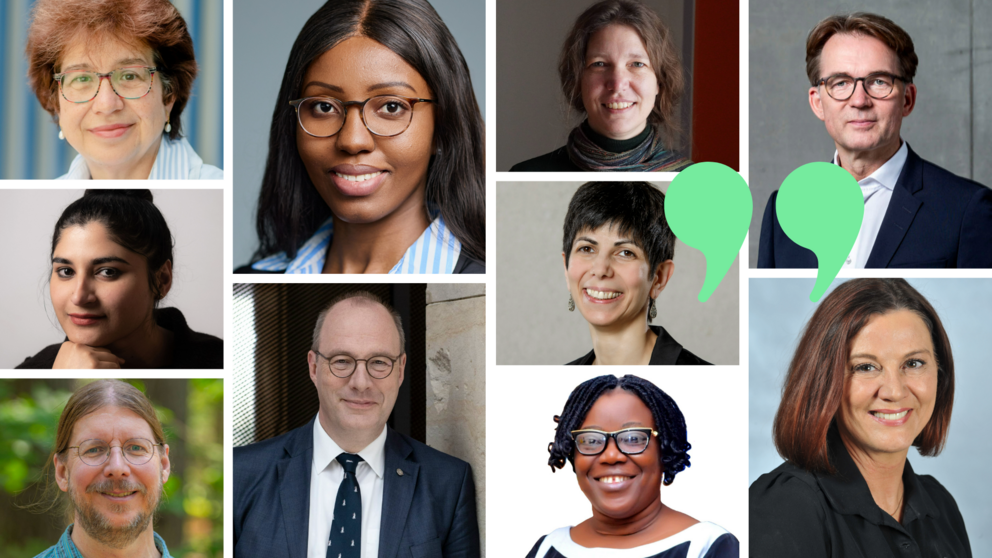

Contact
Press, Communications and Marketing
Tel.: +49 228 833-144
Fax: +49 228 833-441
presse[at]avh.de
The Humboldt Foundation asked researchers around the world and in Germany: What would you like to see from Germany’s new government as regards research and trusting scientific exchange in Germany? Where do you see potential? And what do you think needs to be done?
Ensure reliable funding conditions, strengthen scientific freedom, increase the exchange of technology and research and boost long-term prospects for research partnerships, including between the Global South and the Global North: These are some of the areas where international researchers who are members of the Humboldt Foundation network see a need for action on the part of Germany’s future government.
In a recent position paper, the Humboldt Foundation outlined its own priority areas for ensuring cutting-edge research conducted against the backdrop of international exchange: strengthening collaboration between researchers, building long-term (research) partnerships, protecting scientific freedom and researchers at threat, and developing and expanding innovative capacity, science communication and dialogue.
Matthias Tschöp: Offer optimal conditions
“The world is facing enormous challenges. Meeting these challenges requires internationally networked science and research. Scientific freedom, a respectful welcome culture for international researchers, and supportive political parameters are crucial factors necessary to enabling innovative cutting-edge research. In light of this, the new German government must keep the following in mind: In the international arena, we will survive as a location for research only when we recruit the best researchers and offer them optimal conditions for their work. Here, I could imagine expanding the Alexander von Humboldt Professorships.”
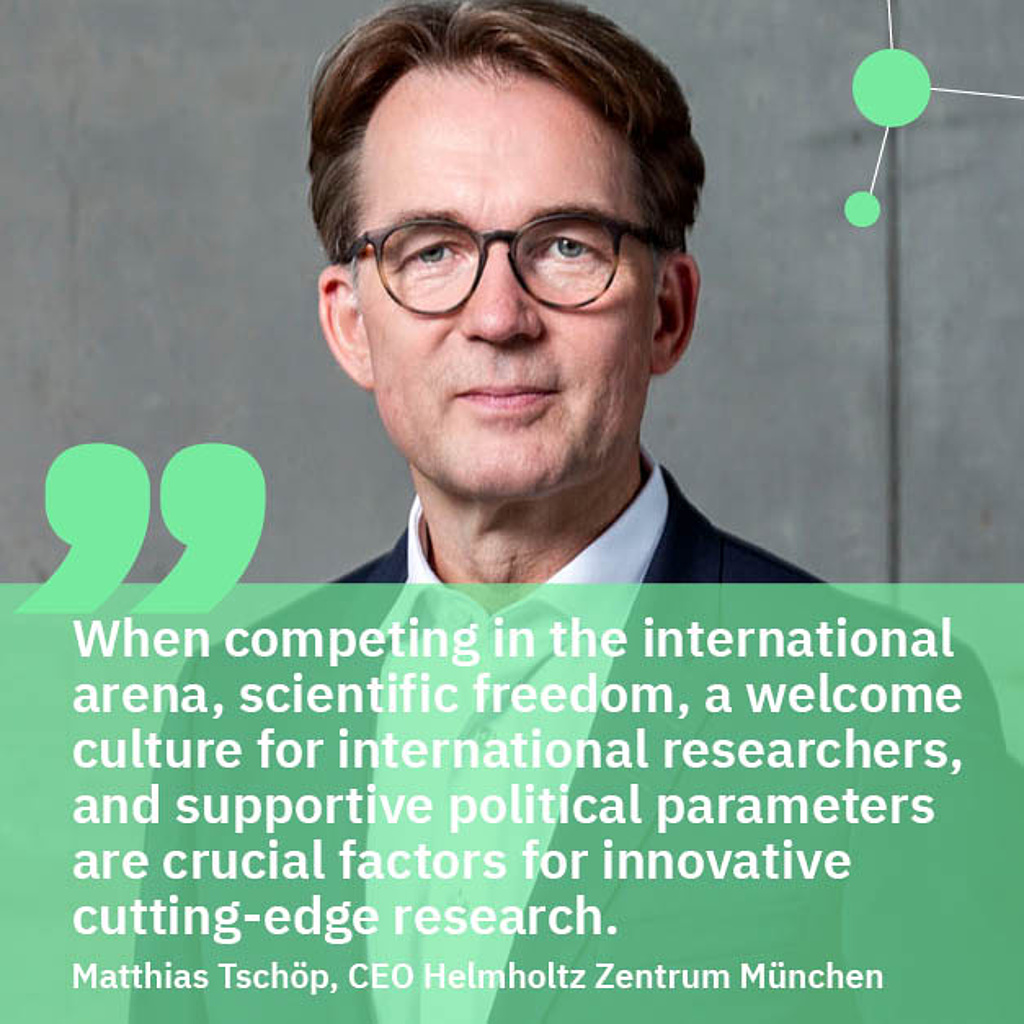
Matthias H. Tschöp is currently CEO and Scientific Director of Helmholtz Munich. He assumes his duties as president of the Ludwig-Maximilians-Universität München in October. A medical doctor and scientist, he returned to Germany from the USA in 2011 with a Humboldt Professorship.
Christa Rautenbach: Foundation for global understanding
“In today's geopolitically unstable world, fostering international academic cooperation is more crucial than ever. These collaborations ensure the very foundations of scientific progress and global understanding. It is imperative to recognise and preserve the invaluable contributions that international partnerships bring to both German and global academia.”
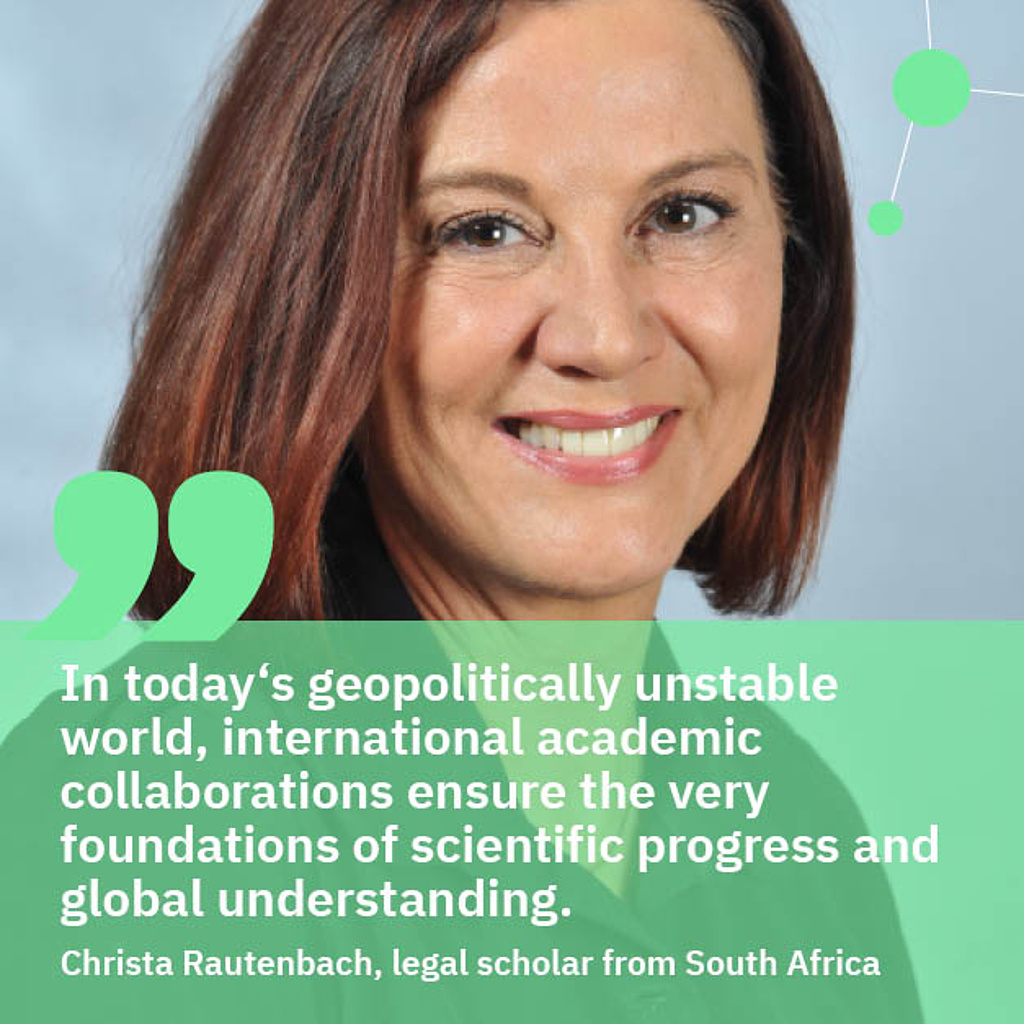
Christa Rautenbach is a legal scholar and professor at North-West University in South Africa. She has conducted research in Germany several times, including as a Georg Forster Research Fellow, and served several years as the Humboldt Foundation’s Ambassador Scientist in South Africa.
Brian McGill: Reliability in uncertain times
“My most productive scientific collaborations have been international; the diversity of perspectives was central to their success. These collaborations lasted over a decade, and would not have been possible amidst unreliable funding. In the USA, it is unclear if the government will pull funding for research on climate change, biodiversity or vaccines – or even valuescientific knowledge. It is critical that European nations keep robust support for scientific freedom, cross-border collaboration, and reliably funded research unrestricted by political whim.”

Brian McGill is an internationally recognised macro-economist at the University of Maine, USA, and a Humboldt Research Award winner. He conducts research on the impact that anthropogenic climate change has on biological diversity.
Anan Alsheikh Haidar: More than a humanitarian gesture
“As a researcher at risk, I was privileged to receive a Philipp Schwartz grant from the Humboldt Foundation. Now, after the fall of the Assad regime, I feel incredibly grateful that I can contribute to my home country — Syria, which needs all the help it can get to rebuild. Supporting researchers at risk is not only a humanitarian gesture, but also an investment in the future of science. However, challenges, such as funding uncertainty and long-term career stability, remain significant hurdles.
Germany has already shown the way with regard to supporting researchers at risk. I do hope the new government will strengthen their protection and expand funding programmes to ensure academic freedom and foster global scientific collaboration.”
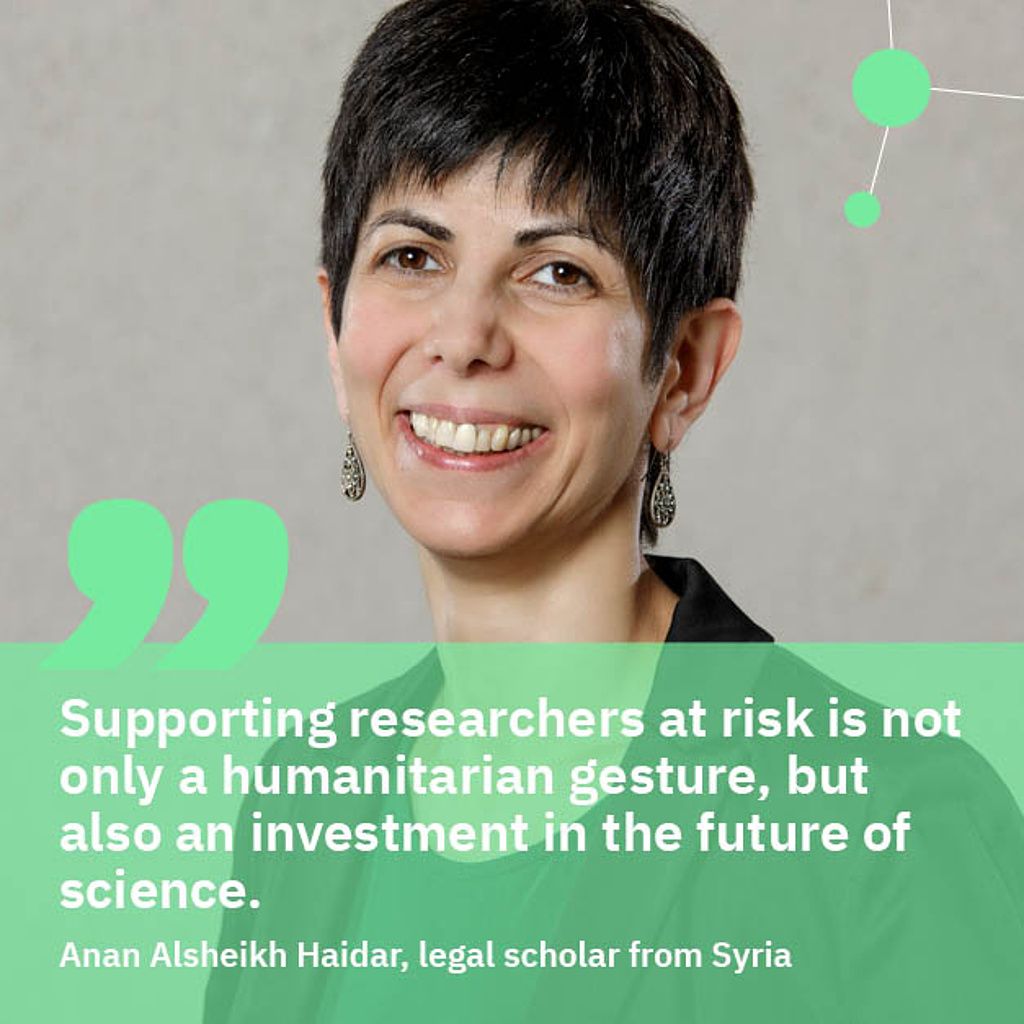
Anan Alsheikh Haidar comes from Syria and was a Philipp Schwartz Fellow at the Institute for International Peace and Security Law of the University of Cologne where she currently works as a research fellow.
Christoph Markschies: Opportunities that everyone deserves
“When I was a student I had the pleasure of working as an assistant for a professor in Tübingen who virtually continually brought great researchers (who even then included women) from all over the world to come to our quaint, little university town in Swabia. That broadened horizons, brought fresh air into conventional research discussions and made it possible for us junior researchers to go to the best addresses in other countries. I would not be what I (hopefully) am today — neither as a researcher nor as a person — without the Humboldt Fellows I met during my studies or these transnational connections. Everyone deserves the kinds of opportunities I had back then. Here in Germany and abroad. No doubt about it! And no reservations!”
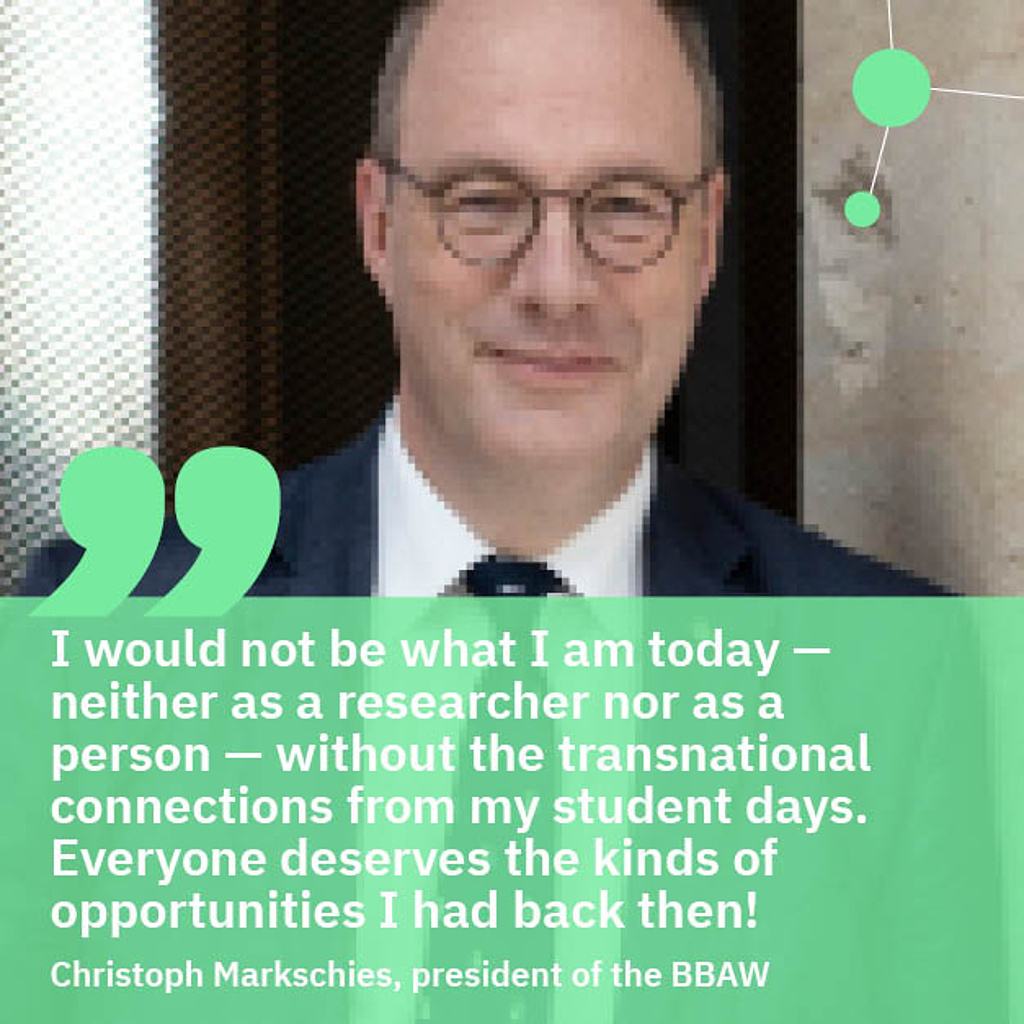
Christoph Markschies is President of the Berlin-Brandenburg Academy of Sciences and Humanities and Professor of Ancient Christianity at the Humboldt-Universität zu Berlin. He remains connected with the Foundation as an academic host.
Oluwatoyin A. Odeku: Greater mobility for fair research partnerships
“The new German government has a critical opportunity to shape the future of international research collaboration by increasing funding and simplifying mobility with flexible visa policies for researchers. A more efficient, streamlined, researcher-friendly visa and residency system particularly for scholars from the Global South, will enhance Germany’s attractiveness as a hub for global talent. This will facilitate long-term partnerships worldwide, strengthen scientific global exchange and ensure Germany remains a global leader in equitable research partnerships.”
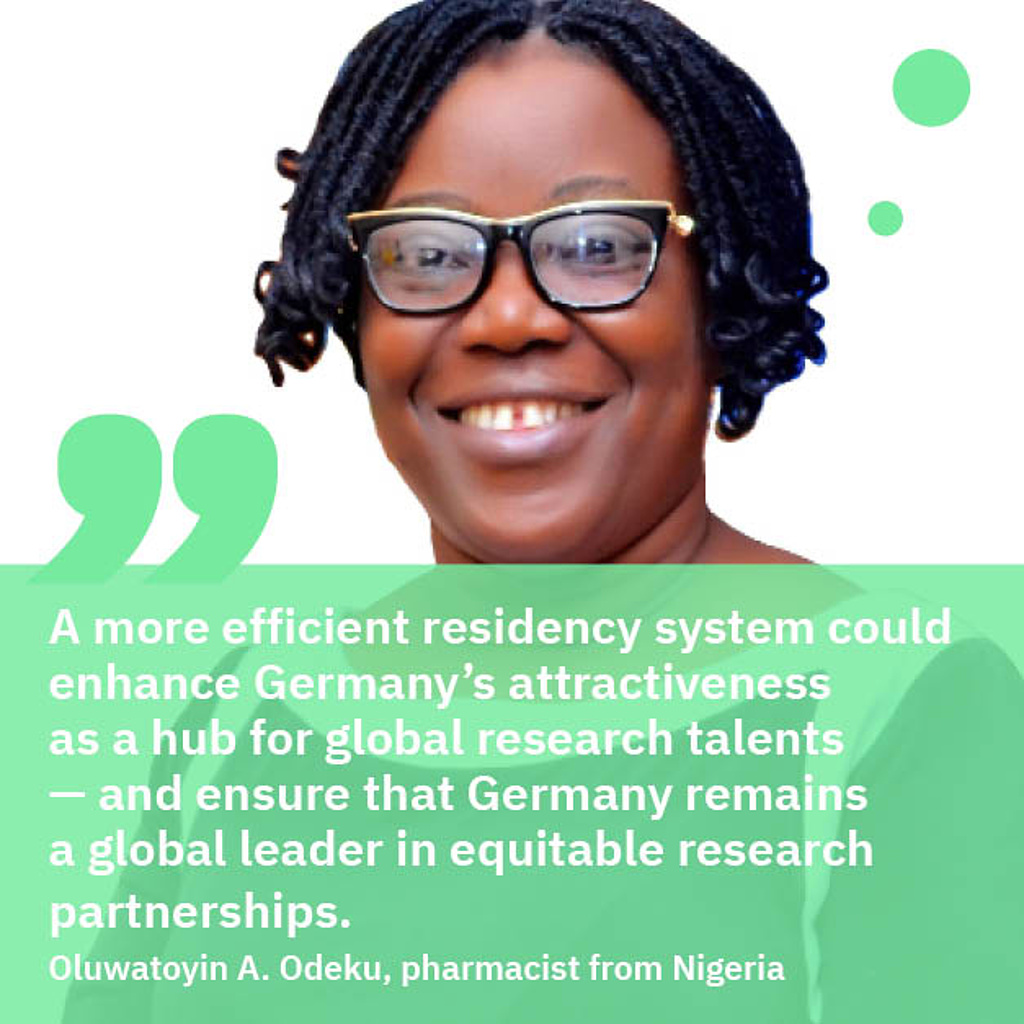
Oluwatoyin A. Odeku is a Professor of Pharmaceutics at the University of Ibadan, Humboldt Ambassador Scientist in Nigeria and a member of the Humboldt Foundation’s International Advisory Board.
Daniel Rückert: Reacting flexibly to developments such as those in the USA
“As we have recently seen, scientific and academic freedom are no longer a given, even in countries like the USA. Germany can take on a leadership role in this connection to ensure that international collaborations and scientific exchange continue. This is particularly important for addressing important scientific issues such as energy, AI, climate and health. Programmes like those offered by the Humboldt Foundation, such as the Alexander von Humboldt Professorship, are an excellent and attractive way to strengthen Germany’s appeal as a location for conducting research and to boost its innovativeness. Such programmes could be further developed and expanded in order to be able to react quickly and flexibly."
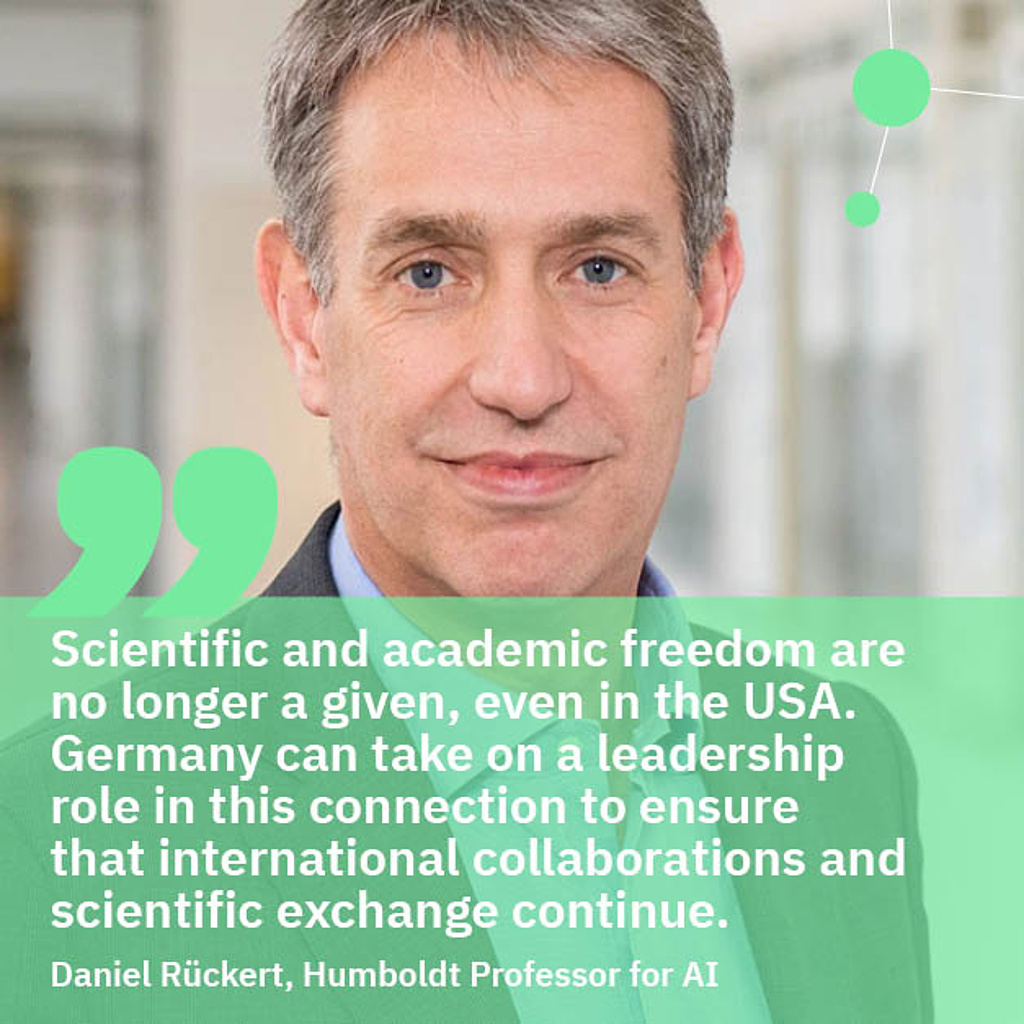
The computer scientist Daniel Rückert is currently an Alexander von Humboldt Professor for Artificial Intelligence at the Technical University of Munich (TUM). His research focuses on developing AI methods for improving medical imaging processes.
Martina Havenith: We are gaining good-will ambassadors around the world
“Science and research are inconceivable without the unfettered cross-boarder exchange of information. Research in Germany is international: Being hosts to researchers from throughout the world, we have direct access to their knowledge and experience. Our research benefits from highly qualified young researchers who come to us from other countries. By developing these personal networks, we gain good-will ambassadors around the world and help our junior researchers by opening doors to the world’s top ranks. Particularly now we need the support of the German government in order to be able to guarantee that this kind of exchange will continue in the future as well.”
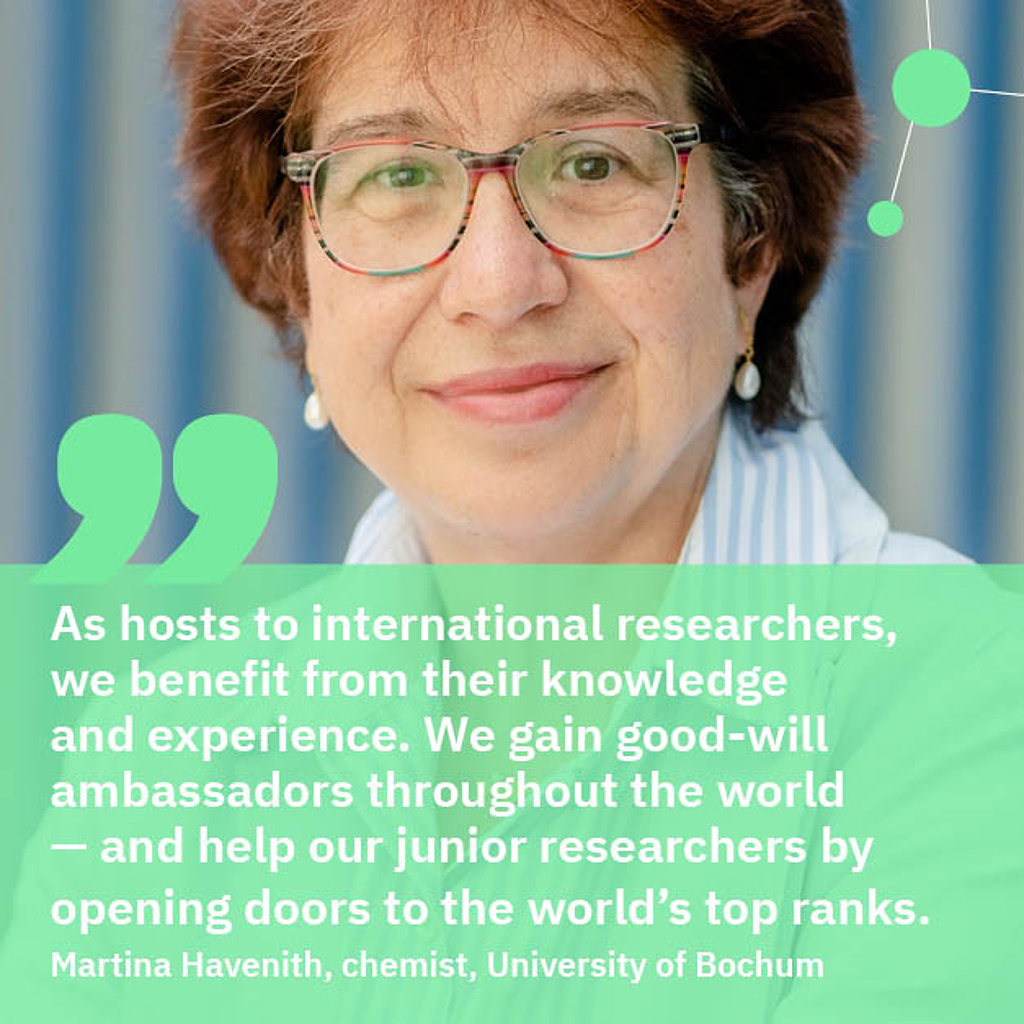
Martina Havenith is a Professor of Physical Chemistry at Ruhr-Universität Bochum and an academic host for the Foundation. She has served as a scout in the Henriette Herz Scouting Programme since 2022.
Amrita Gandikota: Sharing technology and research for startups
“It is crucial to identify and nurture early-stage cutting-edge innovations in areas like climate action, health-care, and impact and deep technology. Germany must introduce platforms that invite global founders for equitable, cross-border partnerships aimed at tech and research exchange. These platforms need to be open, agile and digital, targeted at reducing bureaucracy, cost and time. It would also be valuable to introduce a startup visa for global investors and founders like many other top startup hubs.”
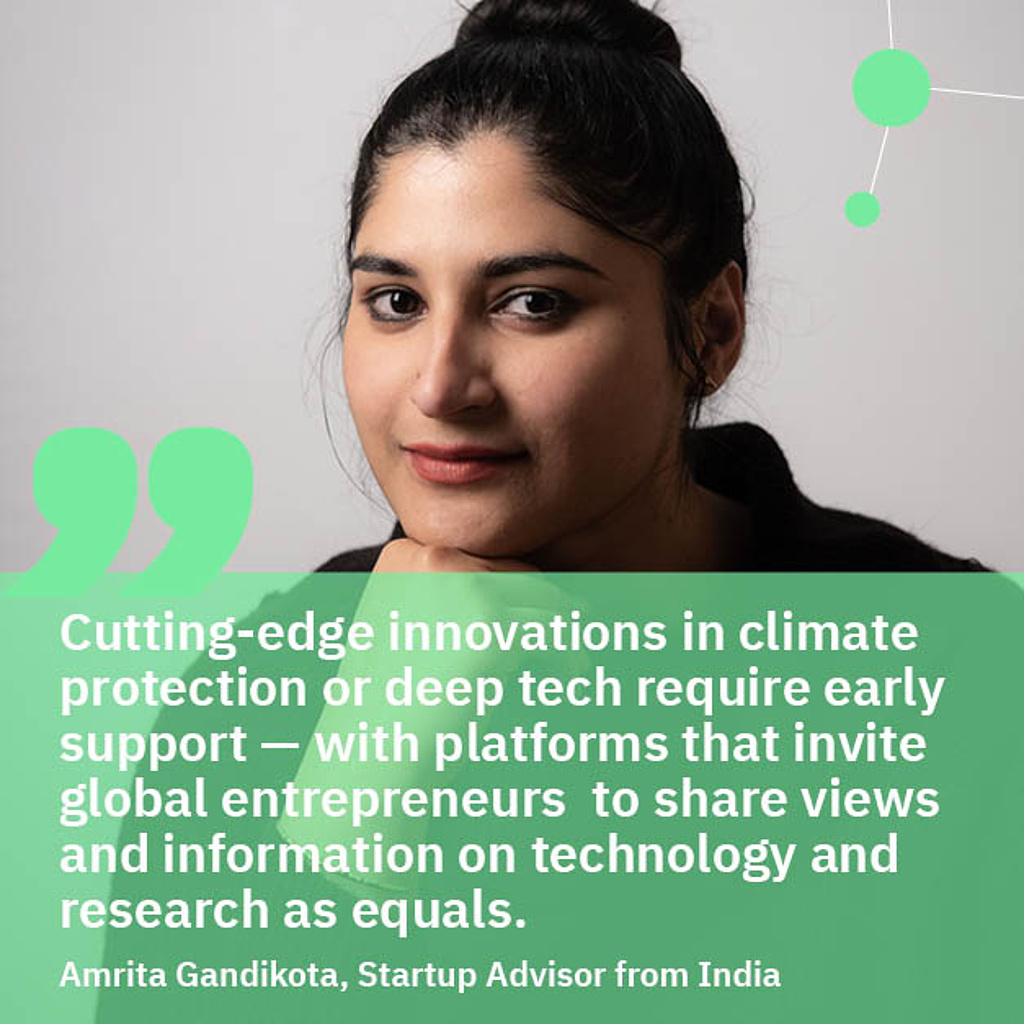
Amrita Gandikota is a Startup Advisor at Humboldt Innovation GmbH at Humboldt-Universität zu Berlin. The former German Chancellor Fellow is herself an entrepreneur and is involved in the Bangalore Indo-German Startup Network and the German Indian Startup Exchange Program (GINSEP), to name just a few.
Kateřina Čapková: Impact on society guaranteed
“Transnational collaboration is a key to successful science and scholarship. Even in the humanities there is a move toward multidisciplinary and international research. Such projects are mutually enriching for all the scholars involved, and they also guarantee a much greater impact of the results on society, in our case, for example, on education. In my career, the Humboldt Foundation has played a key role in establishing contacts with colleagues in Germany. It would be very important if the future German government were to make the promotion of transnational scientific cooperation one of its priorities.”
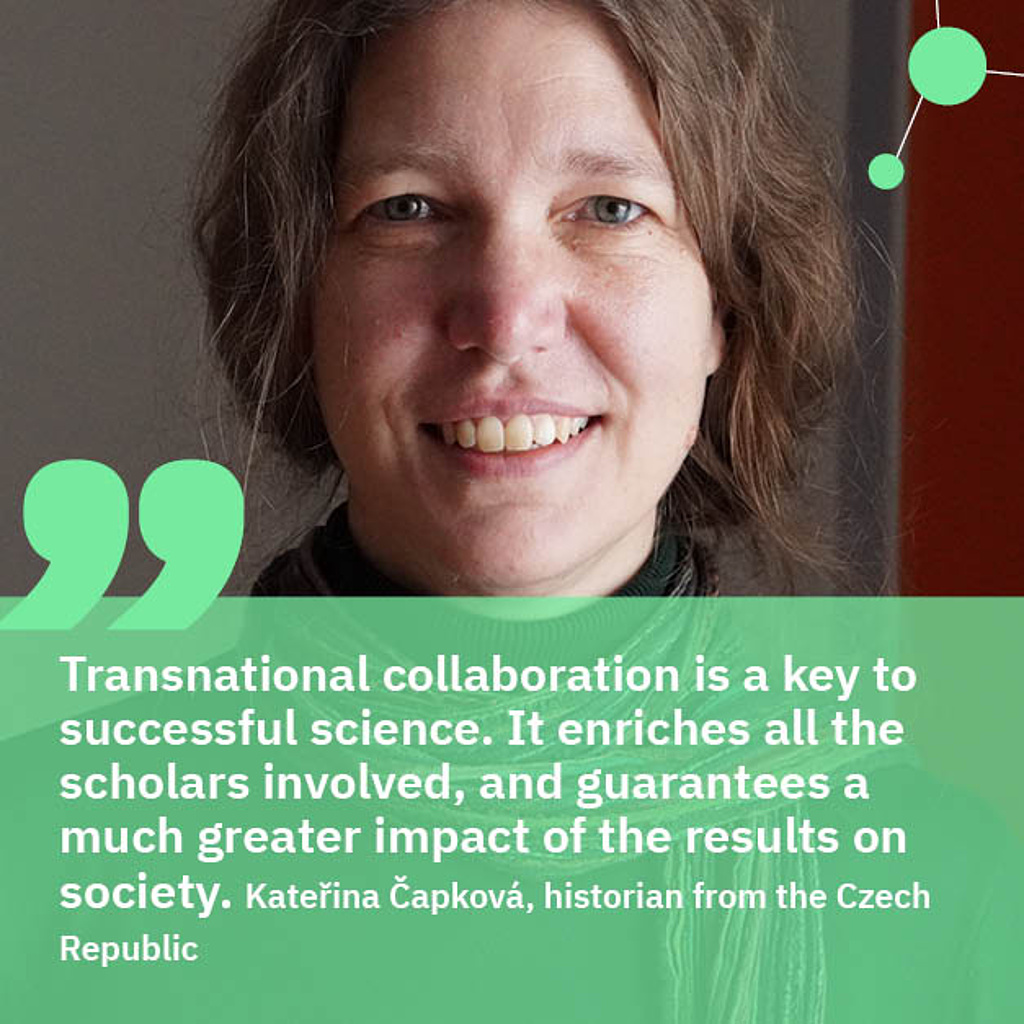
Kateřina Čapková is a historian at the Charles University in Prague, Czech Republic, and an expert in a number of fields that include modern Jewish history in Central and Eastern Europe. She received the Humboldt Foundation’s Reimar Lüst Award in 2024.
Nonhlelo Mathunjwa: Strong global partnerships need long-term collaboration
“As a Humboldt Fellow at Hitachi Energy, I’ve seen how real collaboration drives innovation. Working in a new environment has shown me the value of bringing together diverse perspectives to tackle energy challenges. I collaborated with experts from the Global North and Global South, conducting research for more stable and sustainable energy grids. To strengthen global partnerships, it’s essential to support long-term research collaborations and ensure accessibility to academic exchange opportunities.”
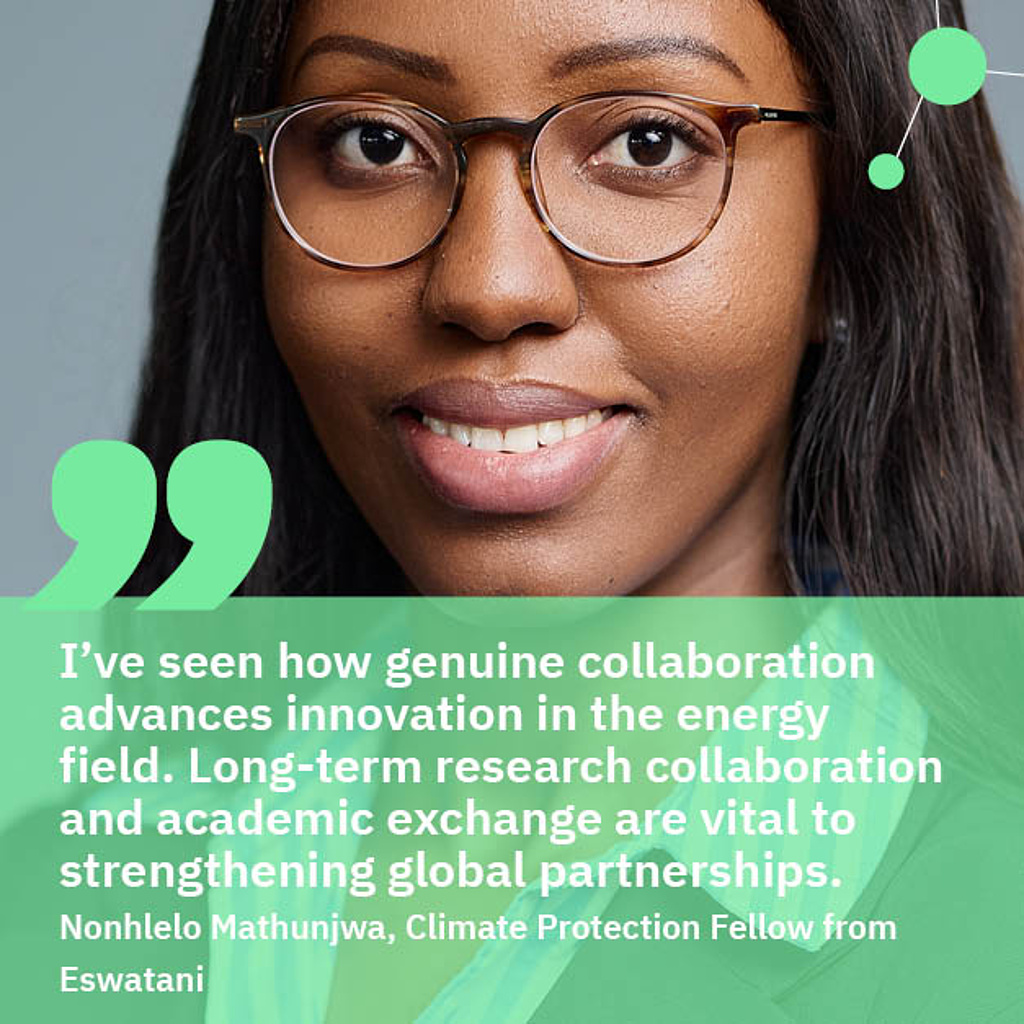
Nonhlelo Mathunjwa from Eswatini is currently an International Climate Protection Fellow at Hitachi Energy, a Mannheim-based company that specialises in sustainable energy. She specialises in electrical power generation.
Every year, the Alexander von Humboldt Foundation enables more than 2,000 researchers from all over the world to spend time conducting research in Germany. The Foundation maintains an interdisciplinary network of well over 30,000 Humboldtians in more than 140 countries around the world – including 63 Nobel Prize winners.
